[ad_1]
Watching the highlights online 18 years later really doesn’t bring home how loud it was, from kick-off all the way to the golden goal.
The constant noise that came from an ever-rippling sea of red made the instant of silence after 117 minutes of frenzied football all the more jarring. It was replaced by a deafening roar and the sight of local journalists, sweating in the warm South Korean evening, running up and down the press box steps at Daejeon World Cup Stadium.
And there was Ahn Jung-hwan running towards the corner flag, men in blue sinking to the ground and looks of wonderment on the faces of hardnosed hacks. If it was surprising that a striker who was struggling for playing time at Perugia had climbed above Paolo Maldini to send South Korea into the quarter-finals of the 2002 World Cup what really shocked was that Italy were out, losing 2-1 to the Taeguk Warriors.
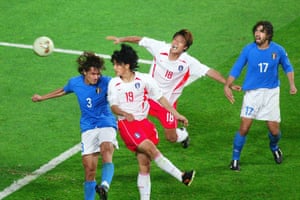
Hours earlier on the buses that left the city centre to the stadium, packed full of red, there was a feeling that it could be done. Victories over Poland – a first World Cup win – and Portugal led Korea to top the group. The nightmare scenario, the reason why Guus Hiddink had been hired, was avoided and South Korea were not going to be the first hosts to exit at the group stage.
There was no pressure against Italy and when the Red Devils held up white cards to spell out “Again 1966” in reference to North Korea’s famous win over the Azzurri in Middlesbrough, the belief that spread around over 40,000 fans was electrifying. Until that is, you looked at the opposition and saw names such as Gianluigi Buffon, Alessandro Del Piero, Francesco Totti and Maldini among others. By contrast, only the two South Korean players, Seol Ki-hyeon at Anderlecht and Ahn in Italy, had any kind of European experience.
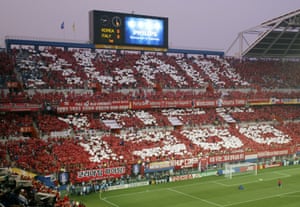
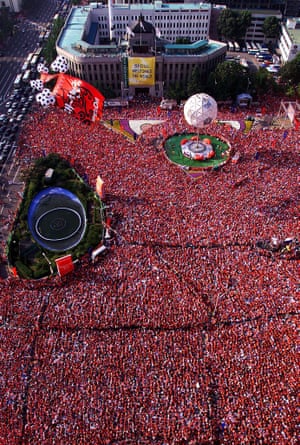
Italy played the group stage in Japan and arrived in central South Korea already unhappy at having had no less than four goals disallowed against Croatia and Mexico. They were to leave the Land of the Morning Calm feeling spicier than the local cuisine though as British commentator Barry Davies said on TV: “And the Italians are out because they never learn.”
The three-time world champions had sat back on the 18th-minute lead from a Christian Vieri header and allowed the high-energy Koreans to come at them. It almost worked as, with full-time approaching, the Asians looked short of ideas. Three minutes from the end, however, the future Fulham and Reading star Seol took advantage of a Christian Panucci stumble and Ahn, who went on to have an unremarkable club career, did the rest.
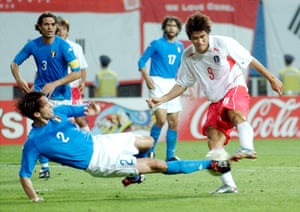
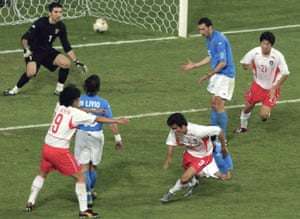
Of course, there was more to the tale such as the red card given to Totti, the second booking for simulation, and a Damiano Tommasi goal being ruled out for offside. It all looks fairly tame when viewed now and, Italians apart, there were few complaints at the time. The defeated team blamed the Ecuadorian referee Byron Moreno, imprisoned nine years later in New York on drug smuggling charges, but they would have gone through had Christian Vieri, who earlier escaped a red for an elbow that broke Kim Tae-young’s nose, not missed an absolute sitter in the final seconds of normal time.
The host nation, beneficiaries of clear officiating errors in the quarter-final against Spain, didn’t care and partied like never before. “We beat one of the world superpowers,” said Hiddink. “We must celebrate tonight and we will celebrate.” Millions were already on the streets watching and many more soon poured out of homes and restaurants. Hours later, downtown Daejeon was still packed with people.
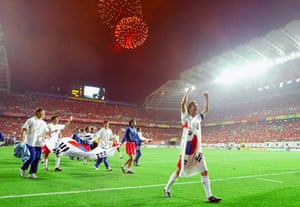
The next day however it was reported that Ahn was to be shown the door at Perugia by the club’s chairman, Luciano Gaucci. “He was a phenomenon only when he played against Italy,” Gaucci was quoted as saying. “I have no intention of paying a salary to someone who has ruined Italian football.”
Ahn didn’t ruin Italian soccer, as the 2006 World Cup win would show, but he did give me (as well as South Korea and surely Asia) my favourite game.
[ad_2]
Source link
